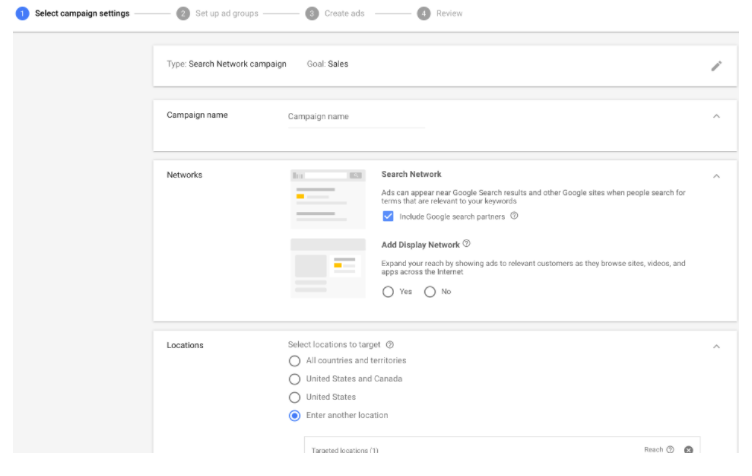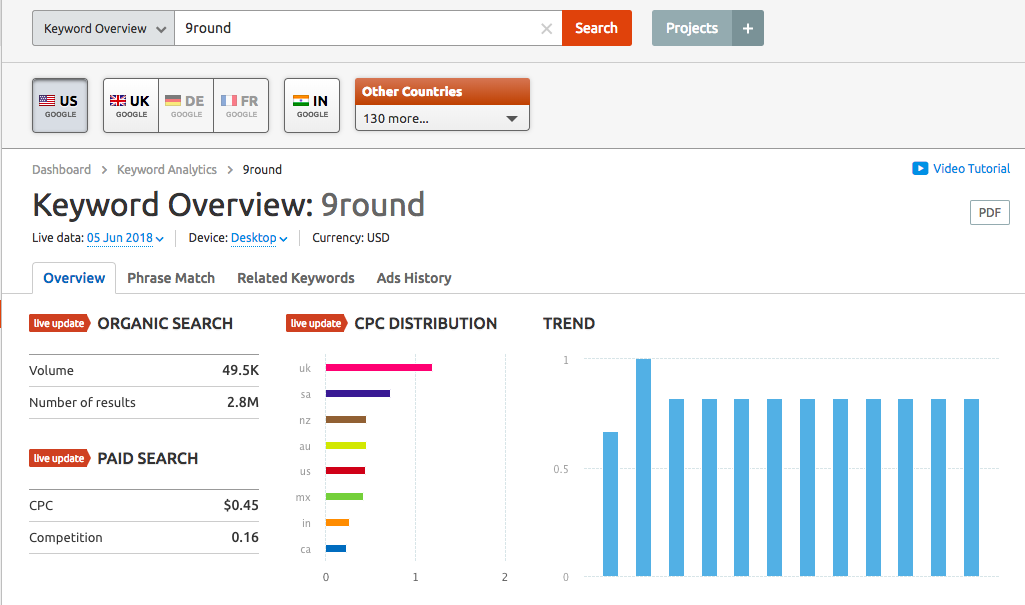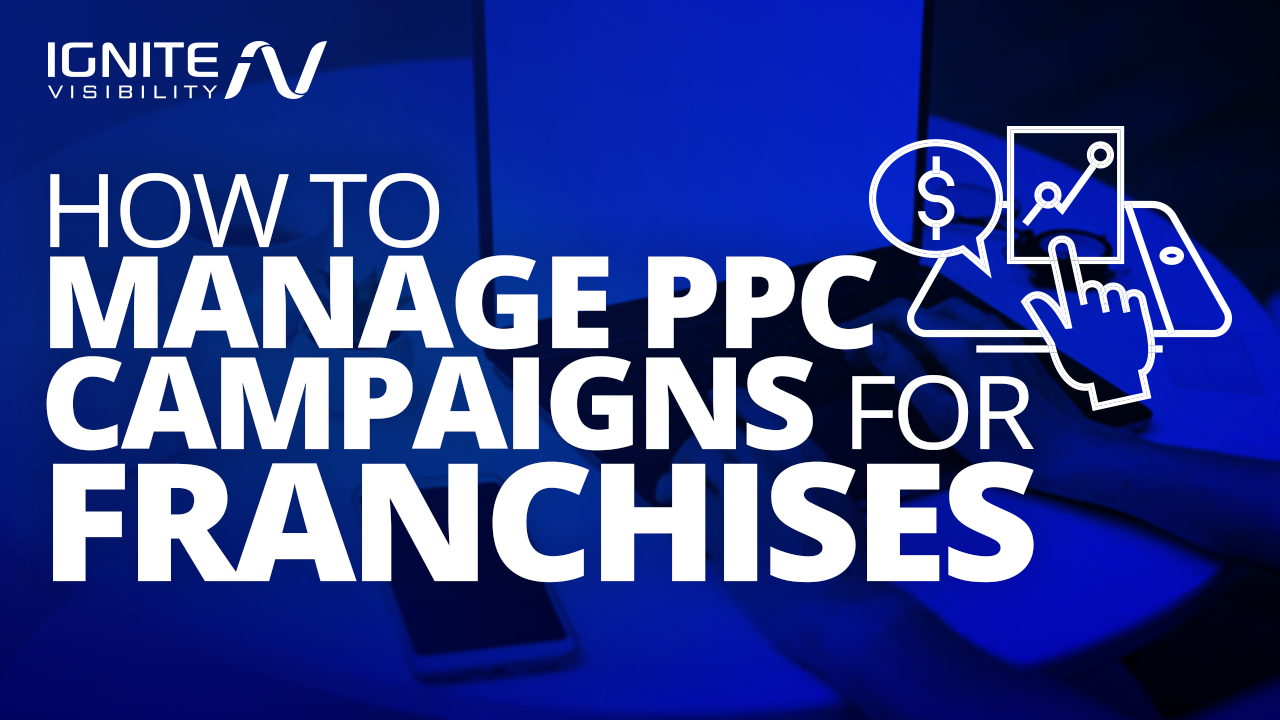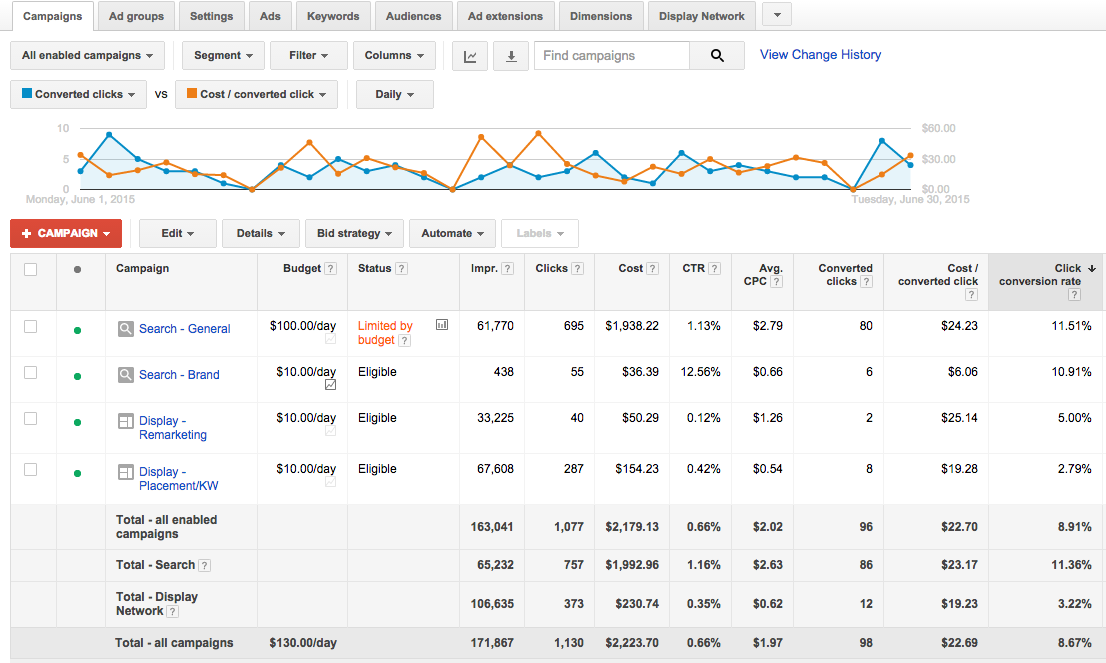Businesses face a few challenges when it comes to franchise PPC campaigns.
Franchises aren’t your average business, and they don’t run your average campaign.
In this article, I’ll cover a few things you need to know to effectively execute and manage a franchise PPC campaign.
What We’ll Cover:
- Who should handle franchise PPC – the franchisor or the franchisee?
- The case for franchisors
- How to manage franchise PPC campaigns at the central level
Who Should Handle Franchise PPC Campaigns – The Franchisor or the Franchisee?
When it comes to franchises, marketers have to make the difficult decision of handling the campaigns at a central level, or trusting the franchisees to run franchise PPC campaigns themselves.
Generally speaking, most franchises will have a corporate marketing plan in place.
These are provided at the individual level and usually require each franchise to contribute a designated amount each month – about $150-$2,000 each month, depending on how comprehensive the plan.
If that plan does include franchise PPC management, it stands to reason that the marketing plan will run on the higher end of the spectrum.
These corporate plans are a common cause of friction between franchises and their franchisees, so it’s best to be aware of all options before deciding how to manage your franchise PPC campaigns.
When it comes down to it, if you do want to trust the campaigns to your franchisees, you should at least be prepared to invest in some high-quality training for each owner to ensure they’re capable of running their own account.
But in this article, we’re focusing on franchises that choose to run the campaigns centrally and the unique challenges they face.
Franchise PPC Campaigns: The Case For Franchisors
-
Brand Consistency Across All Locations
This is a big one when it comes to franchises.
Franchises usually come with a clear message, value proposition, and brand identity. The last thing any owner wants is a franchisee gone rogue, producing ads that are off-message and don’t adhere to company standards.
Perhaps the most prominent reason for franchises keeping control is the ability to ensure each ad adheres to their values and represents the greater franchise in a positive way.
Often, franchises will dictate a set of guidelines to individual franchises that must be adhered to. For example, certain slogans, colors, language, etc. must be included (or excluded).
This gives franchisees some freedom to manage ads, while still maintaining the overall brand identity.
But this can hit a snag when any new campaign messages arise and require enough trust in your franchisees to allow them the reigns.
The number of franchises your company operates can play a part in this as well. If you only operate a small number, it will be relatively easy to keep an eye on all franchise PPC campaigns.
But if your franchises are many, ensuring the quality of each without an actual hand in their creation can easily turn into a full-time job all on its own.
If you don’t want the headache, it’s best to dictate franchise PPC campaigns at a central franchise level.
-
Franchise PPC Campaign Expertise
When it comes to pay per click for franchises, not all franchisees will be qualified.
I know, it seems easy. Just plug in a creative, choose a few keywords and ta da – you have an ad.
But anyone familiar with the biz knows the ins and outs of AdWords and other PPC platforms are far from simple. You have targeting, bidding, and quality scores to contend with, and that’s just the tip of the iceberg.
If you’re running ads at the central level, you have the ability to bring in PPC experts to create and manage each campaign. They’ll bring experience in managing franchise campaigns similar to yours and will know how to effectively run PPC on a multi-location level.
On the other hand, trusting your franchisees with the task can be a shot in the dark. If they don’t know what they’re dealing with, it will likely to take them a while to find any real success.
Always remember, each individual location reflects on the franchise as a whole. Any failing or floundering branch will have a negative impact,
If you’re willing to provide specialized PPC training to each new franchisee, you may be fine. If not, you’re likely better off letting an expert you approve handle the campaigns.
-
Ability to Track and Measure Franchise PPC Campaigns
A centrally-located franchise PPC campaign will allow an in-depth of view of how each strategy or promotion is working on a multi-location level.
This knowledge will lets managers know where to allocate or take away funds, which strategies to focus on in the future, and how well specific locations take to each new franchise.
Access to this also allows managers to act quickly. If they see one campaign failing comparatively, they can react accordingly to help revert the damages. An individual franchisee, on the other hand, may have a much slower reaction because they have much more limited data.
How to Manage Franchise PPC Campaigns at the Central Level
Many – especially bigger franchises – will choose this option. As we’ve just learned, it’s for good reason.
But that doesn’t mean it’s not without its challenges.
Define Your Goals
Managing one overarching PPC account comes with some unique challenges.
The most obvious being this: how do you manage one PPC account for say, 100+ locations?
First, you know what your goals are. Are you going for overall account performance? Or is your ultimate goal to make sure each location performs equally?
For example, your overall efforts may be going quite well, with great CTRs and conversions. But it’s possible that a few locations won’t be performing on par.
Beyond that, it’s very possible that you have franchise locations that overlap. In a city like San Diego, for example, you could have five or six locations competing for the same traffic.
This is where, if your ultimate goal is the overall account, you would have to make tough decisions about where you’re sending your traffic. If one location is seeing the majority of traffic, you would likely assign more of your top tier, generic keywords to that campaign.
But, if you want to even the playing field, you would instead focus your efforts on improving the accounts that lag behind.
For best-case scenario, you want everything you can to minimize internal competition. If one location offers a good or service the other doesn’t make sure you’re pushing that service in your franchise PPC campaign and keywords.
Or, you may notice that one location performs significantly better on certain days or times. Using that information, you can use the ad scheduler in Google Ads to maximize exposure at those times.
Franchise PPC Campaigns: Create Separate Landing Pages for Each Location
This one may seem like a bit of a no-brainer when it comes to pay per click for franchises, but it’s absolutely worth mentioning.
When setting up your location campaigns, make sure that each has its own landing page that includes the individual location’s phone number, address, and creative that caters to that location.
With franchises, you’ll often find that many ads or links lead back to the central franchise page, which then forces users to search for the location closest to them.
As we’ve covered before, the more work the user has to do, the less likely they are to stick around. For you, that means higher bounce rates, less time on site, and lower conversions.
Avoid that by creating landing pages for each franchise PPC campaign that match the creative and tone of the specific ads shown to users.
Focus on Location (Settings)
Franchises are tied to location. And the first step to success is to focus your efforts on local SEO.
The same goes for franchise PPC campaigns.
To start, you want to break each location into its own campaign. This will allow you to properly geo-target those businesses who may have overlapping locations.
Applying geo-targeting – or location targeting – ensures that your ad will only be shown to users within a certain location. It could be an expansive area, like an entire county or region, or an area as small as a 10-mile radius.
Your location settings will be chosen based on the particular area each franchise serves. The more franchises there are in a given area, the smaller each campaign’s geo-targeting radius will be.
You’ll set up your location settings in Google AdWords as you create your campaign. You can find them right underneath where you enter your campaign name and the networks it should appear in.

PPC Campaigns: Use Google AdWords to Set Your Location Settings
To narrow down the location, select “Enter another location.” You’ll have the option to enter by location or radius.
While radius is often the default for most franchise PPC campaigns, franchises will likely do better to narrow down further by zip code or even congressional regions. This will ensure that the right traffic is going to the right franchise location.
You’ll also want to look at your AdWords data to make further campaign adjustments. For example, if your franchise operates a high-end car dealership, you may find that your ads convert more at lower costs in more affluent zip codes and neighborhoods.
If that’s the case, you may want to experiment by increasing your location bids on those higher-converting areas to be more competitive.
You also want to consider how far people are willing to travel for your services. If you serve a need that isn’t urgent, say, a specialized fitness franchise, you can afford to expand your radius a bit further.
But if your service is something people need fast – think urgent cares or something similar – people will be looking for locations as close to them as possible.
Franchise PPC Campaigns: Choose Your Keywords Carefully
When it comes to PPC for franchises, you have two types of keywords to consider: general and location-specific.
As always, you’ll want to begin with a research tool like SEMRush to compile a list of all relevant keywords.
To use the tool, simply log into SEMRush, enter in one of your top keywords, and locate the lists of all organic keywords. This will help you identify any keywords opportunities you might be missing.

PPC Campaigns: Use a Tool Like SEMRush to Find Keywords
As you do research, you’ll want to find keywords to fit into three categories:
- Your brand
- Your individual locations
- Your product
For example, to use the fitness franchise again, phrases like “[company name] before and after” is usually popular in that arena, and may help inform some possible ad strategies in the future.
While targeting location keywords, you’ll want to think outside of just cities and states. Think neighborhoods, landmarks, counties, and things “near” your franchise location.
These will go beyond your brand name. Not everyone will search for “Walgreens in San Diego,” but they may be searching for “drugstores near north park, san diego.” As always, make sure you’ve covered all your bases.
Here’s another tip for local keyword research: find out what your competitors are doing.
Chances are pretty good that you’ve got some competitors in your area who are managing digital marketing campaigns. They may even be running local ads.
Browse those ads and look for ideas that you can “borrow” for your own business.
Additionally, find out which keywords they’re using to optimize their listings for local search. It’s possible that you can use some of those keywords for your own business.
If you want to compete in the arena of keywords, though, you’ll need to ensure that your website is up to snuff. Optimize it for the keywords that you expect people to use when searching for a business like yours.
Also, pay attention to your Google My Business page. Get it up to speed by completing all relevant sections, adding location info, and uploading plenty of pictures that say a lot of positive things about your company’s products or services.
You should also ensure that your development team is using schema markup to give Google plenty of details about your business.
Finally, be certain that your website is mobile-friendly. Lots of people perform local searches on a smartphone because they’re out and about.
Wrapping Up Franchise PPC Campaigns
PPC for franchises isn’t exactly a piece of cake. It takes a lot of work to ensure that
There’s no sugar-coating it: making sure each campaign is optimized for each location is a lot of work.
This is why I recommend bringing in an experienced PPC manager or agency that can help you plan, manage and execute a successful PPC strategy for your business.


